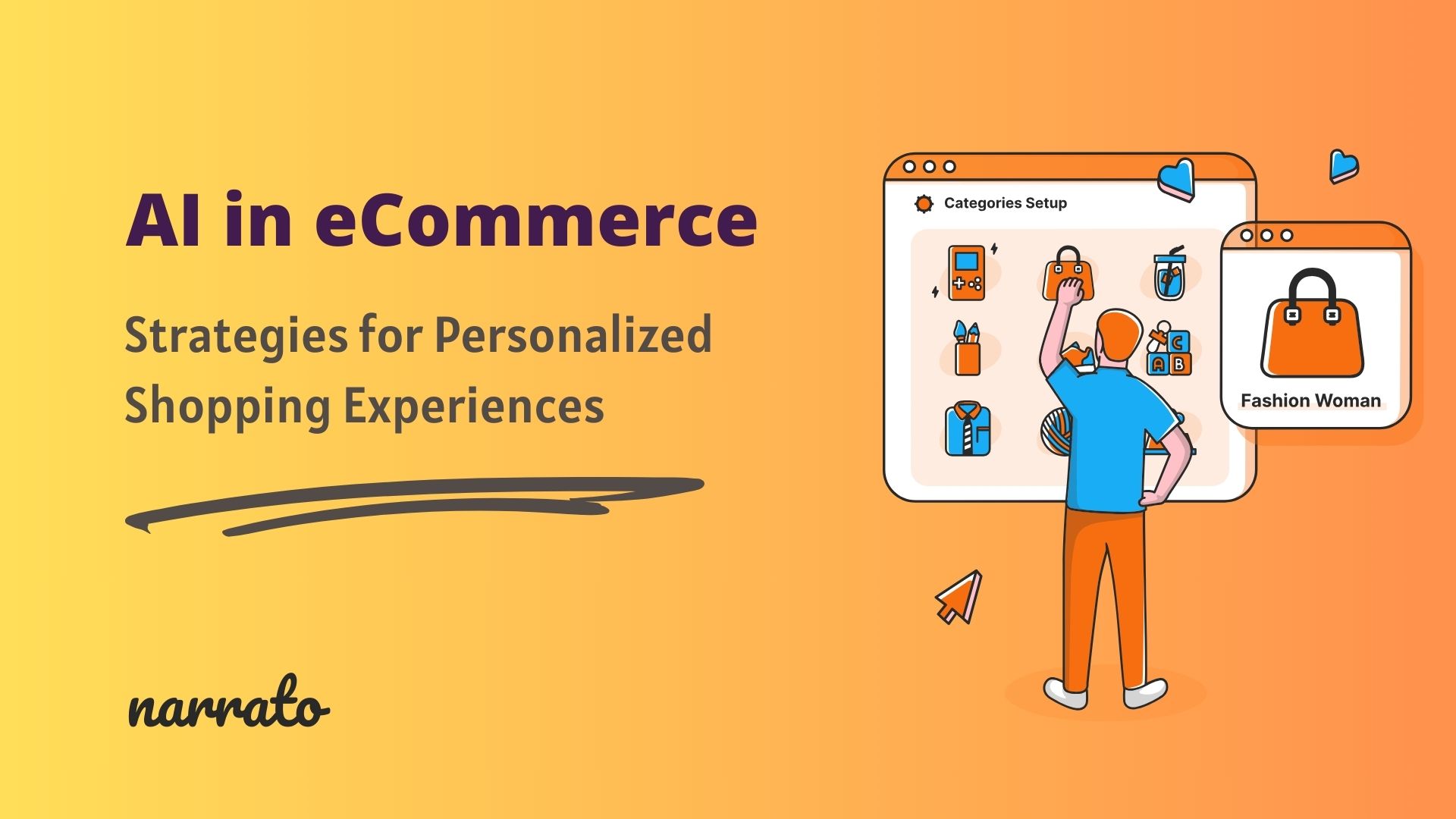Artificial intelligence (AI) has many industries excited at its applications and benefits in streamlining work, increasing efficiency, providing more value to customers, and improving profitability. And eCommerce is no different. Thanks to advanced algorithms and machine learning, AI in eCommerce can offer personalized experiences for online shoppers.
In this blog, we will explain seven strategies for AI integration in the eCommerce business model. We will also summarize how to integrate AI into your eCommerce system securely.
TL;DR Here’s a quick summary video of this
- AI in eCommerce to generate engaging content
- AI in eCommerce for personalized product recommendations
- AI in eCommerce for tailored search results
- AI in eCommerce to provide multi-language support
- AI chatbots for eCommerce
- AI in eCommerce for proactive engagement
- AI in eCommerce for personalized email marketing
- Integrating security in AI eCommerce tools

AI in eCommerce to generate engaging content
AI’s capabilities in content generation have opened new avenues for efficiency and creativity.
AI generators like Narrato’s AI Content Genie can help you craft engaging and tailored social media captions on autopilot. It needs just a one-time input of your website URL and a few themes to generate content that resonates with the target audience, adapting the tone and style to match the brand’s tone and voice.

Additionally, there is a huge library of AI content creation tools on Narrato to create relevant content, including:
- Informative and persuasive AI product descriptions for eCommerce in bulk.
- General copy for landing pages, websites, and emails.
- Well-research and topical SEO-optimized blogs.
- Ad copy for Google or Meta ads, and more
The AI tools can even take your rewrite and refine existing content.
So using AI in eCommerce for content creation and marketing can be truly transformative, saving you hundreds of resource hours and making the process at least 5x faster.
Also read: How to Boost eCommerce Sales with AI and Automation
AI in eCommerce for personalized product recommendations
Imagine being able to read each individual customer’s mind and present relevant product recommendations at each touch point–be it through email content, social media, or your website’s home page. The benefits of AI agents in this context are significant, as they can analyze copious amounts of data, including the customer’s purchase history, journey on your website, product pages they’ve spent the most time on, and products they’ve added to their wishlist or shopping cart.
AI agents can analyze copious amounts of data, including:
- Their purchase history.
- Each customer’s journey on your website.
- Product pages they’ve spent the most time on.
- Products they’ve added to their wishlist or shopping cart.
AI doesn’t just store this data. Its machine learning capabilities allow it to learn about your customer and, using its initiative, present relevant, personalized recommendations that align with your customer’s interests. This level of personalization becomes even more powerful when paired with warehouse management software, ensuring that the right products are not only recommended but also readily available for quick fulfillment.

Personalized recommendations are powerful — Image source.
This level of personalization improves the customer experience and makes for a pleasant online shopping experience.
AI in eCommerce for tailored search results
AI-powered search engines like Luigi’s Box streamline the customer journey because they can understand the context and intent behind a search query.
For instance, when a customer searches for “lightweight summer jackets,” the AI doesn’t only interpret the keywords (like an ordinary search engine would) but also the underlying need for season-appropriate apparel. In addition to the keyword, the AI takes the user’s past interactions with the website into account, including previously viewed or purchased items, to refine search results and suggest complementary products.
Additionally, if the AI detects the customer is in a tropical region, it may prioritize jackets suitable for warm weather or take it a step further and offer custom shorts to pair with the jacket. By contextualizing search queries, AI provides a personal touch in that search results are tailored to each user’s specific needs and preferences.
With advanced search intelligence solutions, businesses can deliver hyper-relevant results, improving the overall shopping experience. And if customers can find what they want quickly, you’ll make more sales and boost customer satisfaction. You can also use CSAT software to measure customer satisfaction effectively and gather valuable insights through surveys and feedback forms.
AI in eCommerce to provide multi-language support
Online retailers operating in multiple countries can use AI to provide language-specific content.

The case for translating your website is strong — image source.
Businesses can seamlessly generate content in multiple languages with tools like Narrato’s AI writer which supports AI content generation in 20+ languages. Or they can translate their content into diverse languages by employing tools such as Narrato’s AI translation tool or any other AI translator, tailoring the shopping experience to each customer’s geolocation. This sophisticated strategy fosters a deeper connection with customers and exemplifies how AI shapes the future of cross-cultural, personalized online shopping.

AI chatbots for eCommerce
Customers are more likely to convert if they can access the necessary help and support. AI chatbots aren’t limited to a handful of phrases or basic query processing — they can handle a wide range of complex customer queries. But while text-based chatbots are a powerful tool, modern eCommerce businesses are also leveraging white label AI voice agents. Unlike simple interactive voice response (IVR) systems, these agents aren’t limited to a handful of phrases or basic query processing — they can handle a wide range of complex customer queries over the phone, providing a more natural, human-like interaction.
Customers are more likely to convert if they can access the necessary help and support. AI chatbots aren’t limited to a handful of phrases or basic query processing — they can handle a wide range of complex customer queries.
For example, a customer unsure about the right shoe size can get immediate help from a chatbot. The chatbot might ask a few targeted questions about the customer’s usual size and preferences, then offer relevant recommendations regarding the most suitable size or alternative shoe styles.
The AI chatbot learns from each interaction, which allows it to improve responses for a better shopping journey. Also, it’s very important to integrate the chatbot with the right help desk software requirements and ensure that all customer interactions are efficiently managed and monitored. This allows for more complex issues to be directed to human agents when necessary, providing a smooth transition from AI to live support.”
AI in eCommerce for proactive engagement
You can empower your business to engage proactively with customers by using sentiment analysis. Respond swiftly to concerns identified through AI-driven sentiment analysis or seize opportunities to capitalize on positive feedback, fostering a proactive and responsive customer relationship. Additionally, conduct a PESTLE analysis to understand the external factors influencing customer perceptions and preferences, enabling you to tailor your strategies effectively.
For instance, House of Joppa, a rosary beads and Catholic store, exemplifies the integration of AI tools into eCommerce. Using Hotjar, an AI-powered platform for understanding user behavior, House of Joppa employs features like heatmaps, session recording, surveys, and polls. This strategic implementation enables the customization of user experiences, leading to improved conversion rates and heightened buyer satisfaction.

AI in eCommerce for personalized email marketing
Through AI algorithms, businesses can segment their email lists with incredible precision, ensuring that each customer receives content that resonates with their specific interests and shopping behaviors. Ensuring seamless eCommerce fulfillment can improve customer satisfaction, reduce errors, and make personalized marketing efforts more effective.
For example, a customer who frequently purchases sports equipment might receive emails highlighting the latest arrivals in athletic gear or exclusive discounts on fitness products.
Similarly, a customer who’s browsed kitchen appliances but hasn’t made a purchase might get an email featuring a buying guide for the latest kitchen gadgets, along with a special offer to nudge them towards a purchase.
This level of personalization, from an email’s subject line to body content, improves the likelihood of conversion.
For crafting relevant and personalized emails, including email sequences you use tools like Narrato’s AI email writer or AI sales email sequence generator.
Integrating security in AI eCommerce tools
Understanding the differences between SAML and OAuth is crucial for developing robust AI-driven eCommerce systems that aim to provide personalized shopping experiences.
SAML primarily focuses on authentication and is a core component of any robust SSO solution (Single Sign-On solution), playing a pivotal role in creating unified user profiles across diverse platforms. This suitable profile is invaluable for AI algorithms seeking a comprehensive understanding of user preferences and behavior.
On the other hand, OAuth’s emphasis on authorization and secure API access ensures that AI applications can access and analyze specific user data, contributing to personalized recommendations.
Using an API management platform further enhances this process by providing tools that help you securely expose your APIs to external developers and partners, for codeless automation testing purposes for example, ensuring that your integrations are powerful and protected against unauthorized access thanks to various authentication methods.

The combination of SAML and OAuth facilitates a secure and seamless integration of AI into eCommerce, allowing for real-time decision-making and enhancing the overall user journey. Also, properly managing non-human identities within this security framework ensures that automated processes and AI-driven functionalities operate with appropriate permissions. This comprehensive approach not only fosters user trust through safe data practices but also enables the transformative potential of AI in crafting highly personalized and secure shopping experiences. As you scale GenAI across your store and back office, strong enterprise AI security — spanning both using AI to enhance defense and securing AI systems themselves — is crucial. Practical steps include adopting recognized AI security frameworks, enforcing tenant isolation across data and model resources, implementing model sandboxing, and hardening prompts/inputs to prevent injection and data exfiltration. Pair these with continuous discovery to curb shadow AI and AI-specific posture management beyond traditional EDR and vulnerability scans, so your recommendation engines, chatbots, and analytics run safely at scale.
You should also consider implementing Cloud Security Posture Management (CSPM) as part of your security strategy. CSPM provides continuous log monitoring and compliance assurance, ensuring that your cloud environments are not only optimized for performance but also safeguarded against potential security threats. This added layer of security is critical in protecting sensitive customer data and maintaining the integrity of AI operations within your eCommerce platform, particularly if taking a ‘bring your own cloud‘ approach with an internal cloud infrastructure. Given the increasing reliance on cloud services, the risk of service interruptions can have serious consequences for business continuity. Recent Cloudflare outages have underscored the risks of relying on a single cloud provider, emphasizing the value of multi-cloud management platforms that deliver unified visibility and control to maintain uptime and security across diverse cloud environments. To support this setup further, multi cloud management platforms provide unified visibility and control across all cloud services, reducing operational complexity while reinforcing security governance.
Beyond security, AI also plays a crucial role in optimizing the backend operations of eCommerce businesses, including procurement. Procurement analytics powered by AI helps businesses optimize their supply chain by providing actionable insights into spending patterns, supplier performance, and inventory levels. For instance, AI algorithms in a purchase order system can analyze historical purchase data to predict future demand, enabling eCommerce businesses to maintain optimal stock levels without overstocking or understocking. An AI data analyst can further interpret these insights, ensuring that complex data is translated into clear, strategic actions. AI can also assess supplier reliability by analyzing metrics like delivery timelines, quality consistency, and cost efficiency, empowering businesses to make data-driven supplier decisions. Procurement management software can further enhance this by offering advanced tools to automate and streamline procurement tasks, helping businesses make more informed decisions and improve overall efficiency.
Wrapping up
In this blog, we’ve discussed seven AI adoption strategies for eCommerce. The overall advantage of AI is the ease with which it can help potential customers personalize their experience — through emails, social content, or product recommendations.
To secure loyal customers through your online store and leave competitors in the wind, carefully assess where AI can enhance the already meaningful human work.
We hope our blog has given you some ideas–and if you’re keen on exploring AI’s content creation capabilities, start a Narrato free trial.
Want to stay up-to-date with the latest and emerging trends in the eCommerce world? Here’s our list of Top eCommerce Conferences to attend in 2024.

Author bio:
Luca Ramassa

Outreach Specialist at LeadsBridge, passionate about Marketing and Technology. My goal is to help companies improve their online presence and communication strategy.




